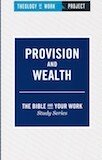Jesus and the Numbers
Blog / Produced by The High Calling
About a year ago, I got enmeshed in the controversy over the alleged "Jesus Family Tomb." This occupied the world's attention for about five minutes back in February 2008, when the Discovery Channel ran a documentary claiming that the tomb of Jesus had been found—complete with his mother, brother, wife, and son.
The documentary folks hired a statistician to run their numbers. They claimed that the odds were 600 to 1 that this was, in fact, the real tomb of Jesus. That's a probability of 99.84%, which would be pretty high if it were correct.
Most people took a quick look, yawned, and ignored it. The claim was, after all, awfully extreme, and those odds quoted were just too, too, too good to be true. And, um, since when did Jesus have a wife and son?
Because I have a Ph.D. in physics, I took a look and decided to investigate. I jiggled my network of contacts, talked to some archaeology people and some New Testament scholars and historians.
What I found were six problem areas in the calculations. In each case, the documentary people had taken the interpretation most favorable to the "Tomb Hypothesis." That's why they got 600 to 1 odds.
When I had all the data, I ran my own numbers. The answer you get depends on what decisions you make. What I found was that it's not easy to get a probability higher than about 2% that this is the real tomb of Jesus.
Of course, I published my results on my website, and that series of articles attracted quite a bit of attention around the world. A number of scholars emailed me or called to discuss those pesky numbers. A documentary producer sent out a camera man to interview me.
Ultimately, I was asked to referee the official publication by the documentary's statistician, Dr. Andrey Feuerverger. His article was published in the Annals of Applied Statistics, along with responses from eight referees. I included with my response a 29- page technical article explaining how to do the calculations.
All of this, of course, has sucked enormous numbers of hours out of my life for the past year. One of my friends told me recently that he thinks what I did was "heroic."
I thought that was quite funny. The truth is that I didn't do all those calculations in order to "defend the faith."
As far as I can see, "the faith" is pretty durable and doesn't need any defending, least of all from a geek like me.
I didn't spend all those hours calculating in order to "rescue Jesus." I did it because I wanted to know the truth. I wanted to know what the real odds were of that tomb being authentic.
I did the calculations because nobody else who knew how to do them seemed to want to. Conversely, nobody who wanted to do them seemed to know how.
A lot of Christians have thanked me for "proving the tomb wrong," which is not exactly what I did, because a probability calculation is not a proof.
I wonder if they'd have thanked me if the numbers had come out higher? What if I'd shown that the odds really were 600 to 1? I don't think anybody would have called me a "hero" for that. I'd have gotten a ton of hate mail instead.
But if those are the numbers I got, that's what I'd have published. That would be the only honest thing to do.
Is that heroic? Or is it just being faithful in your work?
Is it possible—just possible—that those are the same thing?
Editor’s Note: You can read more detailed analysis from Randy Ingermanson on his blog. Or check out his newsletter about fiction writing—the largest of its kind in the world. No kidding.
Randy earned a Ph.D. in physics at U.C. Berkeley and is the award-winning author of six novels and one nonfiction book. He writes about "The Intersection of Science Avenue and Faith Boulevard."





